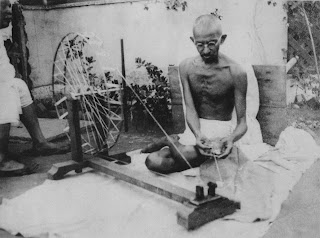Eternal Mahatma: The Life and Legacy of Mohandas Karamchand Gandh
Mohandas Karamchand Gandhi, an emblem of peace and non-violence, was born on October 2, 1869, in Porbandar, a small coastal town in the western Indian state of Gujarat. His life, imbued with the principles of truth and non-violence, has left an indelible mark on the world.
Gandhi's early education took place in the dusty lanes of Porbandar and Rajkot. Later, he traveled to England in 1888 to study law, a journey that began his transformation. In the multicultural milieu of London, Gandhi was first exposed to various religious philosophies, fostering a deep sense of tolerance and understanding in him.
Upon returning to India in 1891, Gandhi struggled to establish a successful law practice. His life turned pivotal in 1893 when he accepted a year-long contract to work in South Africa. There, amidst the rampant racial discrimination, Gandhi's philosophy of satyagraha, or non-violent resistance, began to take shape. He spent 21 years in South Africa, fighting for the rights of the Indian community.
Gandhi's return to India in 1915 marked the beginning of his involvement in the Indian independence movement. He transformed the struggle into a mass movement, emphasizing non-violent resistance. His leadership in the Dandi Salt March in 1930, a 240-mile march to produce salt in defiance of British laws, symbolized his non-violent approach and brought him global recognition.
Gandhi's philosophy was not limited to political freedom. He championed social reforms, including the upliftment of the 'untouchables,' whom he named Harijans, or children of God. He also strongly advocated women's rights and self-reliance through swadeshi, the policy of supporting Indian goods and industries.
His significant achievements include the Champaran agitation in 1917 for the rights of farmers, the Non-Cooperation Movement in 1920 against British rule, and the Quit India Movement in 1942, which intensified the call for India's independence. Gandhi's efforts culminated in India's independence on August 15, 1947, although it was accompanied by the pain of partition.
Tragically, Gandhi's life was cut short when he was assassinated on January 30, 1948, by Nathuram Godse, a Hindu nationalist. His last words, "Hey Ram" (Oh God), reflected his profound spirituality.
Gandhi's impact transcends national boundaries and generations. His commitment to non-violence inspired movements for civil rights and freedom worldwide. Leaders like Martin Luther King Jr. in the United States and Nelson Mandela in South Africa drew inspiration from his methods and philosophy.
Gandhi's life was a testament to the power of peace, tolerance, and non-violence. His legacy continues to inspire countless individuals fighting for justice and equality. His life story, from a modest upbringing in Gujarat to becoming the father of the Indian nation and a global icon of peace, serves as a beacon of hope and courage in a world riddled with violence and strife.



Comments
Post a Comment